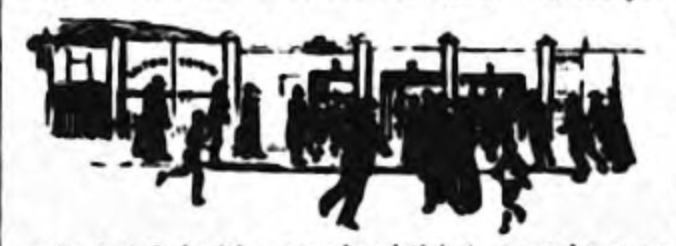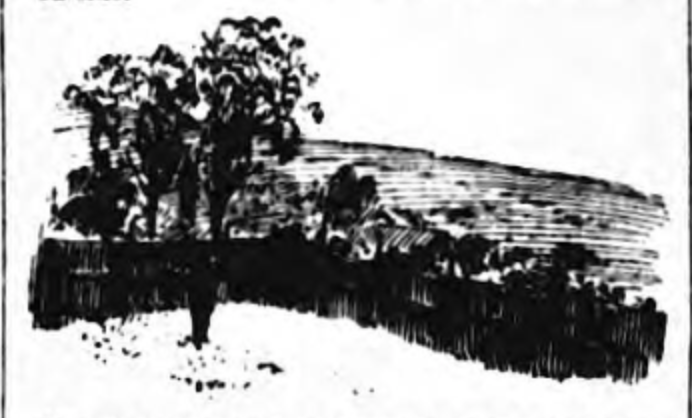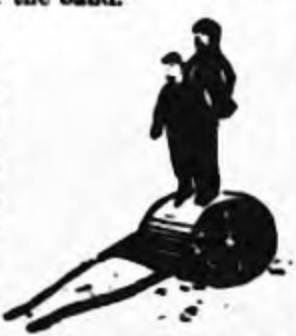Going to a Luton match in 1894
What was it like going to a game in 1894? Let us go back to the 27th October 1894. It is the first season in the Southern League and the Straw Plaiters are playing at home to Southampton St. Mary’s at the Dallow Lane ground. Follow this spectators experience which comes from The Luton Reporter of the 3rd November 1894. The reporter, who was clearly classically educated, we know only as “the Observer.” I have added the artists sketches but they are not very clear. McCrindle was the Luton captain and we played in red shirts. My comments are in square brackets.
“Like the measles, all have to go through it, there is no escaping the football fever. It seizes alike the merchant and the mechanic, the baker and the butcher’s boy, the matron and the maid. It is the one topic of conversation from Saturday till Monday, and for once are forgotten the changing condition of the weather and the flaming details of the war between China and Japan. Even the grocer’s boy and milkman compare notes on the merits of the latest match as they hand in their orders at the door. But the acute stage of the fever is reached on Saturday evening, when the points of the game are eagerly discussed at street corners, and the tension is only relieved at the appearance of the paper boys, whose cries are heard rising clear above the noise of the streets.

The rush to the football field on the afternoon of a match is a novel sight. As if at a given signal thousands wend their way from all quarters along George-street and on to Dunstable-road. You notice that some leave the ranks of the crowd when they come to Dallow-lane [the entrance to the ground was in Dunstable Road so if you were going down Dallow Lane you were going to try to watch the match over the fence/hoardings for free]. They are seemingly bound for the shady nooks of Daffy Wood, but as you will see later on they form themselves into what may be called the blackleg brigade, who hang themselves onto the hoarding, and with some bold urchins, view the operations on the field as such moments as the back of the gentleman in blue [Policeman] is turned on them. Should you not be fortified with a members’ ticket, you take your place at the rush at the turnstile and pay your plebian sixpence along with the crowd. It is in such a gathering as this that the small boy asserts his individuality. Several times was that touching tune “After the Ball” whistled into my ear, and then as he stopped short and struggled to insert a hand in his back pocket, he cried to his companion, “I’m blowed Bill, but I can’t reach my tanner’ [sixpenny piece]. You may consider yourself fortunate if you escape a prodding in the ribs or are not elbowed against the jamb of the gate. At the pay-box progress is easy, and once passed it was a wild skelter across the field. A burst of applause now fills the air, and behold
With some good ten of his chosen men
McCrindle hath appeared,
On the broad plain by Dallow Lane
Southampton “Saints” to beard [boldly confront]
The ropes are lined by thousands of spectators, and looking along the sea of faces you notice a display of millinery prominently set off by an occasional red feather, showing that many fair ones are present to see and be seen. The grand stand, where everybody seems to be in holiday attire, is packed. There, too, you notice a profusion of colours proclaiming the large number of ladies assembled no less than the variety of their costumes. As for the sporting gents [bookmakers], there is no mistaking them in their long brown coats, dotted with large white buttons, as they show their figures off in front of the stand. They love the crowd be it at a horse or football meeting, and right royally do they strut round the ground. Query – Why is it that that class of coat is made as if with the idea of plenty of room to grow is, and who has ordained that its colour should be brown? On the railway line standing against the sky is a small group who, while they enjoy a free view feel themselves elevated by their position, but are correspondingly low down in the estimation of the crowd on the field. They are much more comfortably situated than their brethren at the fence at the Dallow-lane side who, in the face of the police-constable have occasionally to describe figures which Euclid [Ancient Greek mathematician] himself by no manner of means could demonstrate. Sometimes in this corner of the field a number of heads present themselves as if spiked on top of the hoarding for the criminal offence of surreptitiously witnessing the game. A vigilant constable is posted there, and when he directs his attention to the group the youngsters are awed by him, while the more bold companions look unutterable things, and gratuitously tell him, in football as she is spoke, that he is simply ‘off-side.’

My artist colleague, who was making a thumb-nail sketch of the scene, ventured to remark that if such language was deemed ‘fit utterance for the gods,’ but I could only reply that i believed the world was now resigned to the fact that football had given us another language. What a wealth of literary embellishments is there not in the terms and record of the manly game. There is the phrase ‘It’s a beauty’ to describe a smart, scientific kick. As for the ball itself, you may call it by a half-dozen names. Should you be of a mathematical turn you will no doubt term is the ‘sphere’ or the ‘oval’; if possessed of the commercial instinct you simply call it the ‘leather,’ and bring to mind its origin by dubbing it the ‘hide’ or ‘bladder.’ A storm of cheering now sweeps over the ground directs attention to the scene of the fray. The name “Gally” [Hugh Galbraith] is on everyone’s lips, for that gentleman, whose marked characteristic is shooting the ball, has scored a goal for the ‘Reds.’
Wandering round by the skirts of the crowd one may note its passing humour. Some of those who stand in the front row at the ropes occasionally display a degree of politeness that is very touching, and will assure you that you cause them not the least inconvenience by going in front and shielding them from the cutting wind! A grave moment in the course of the play is when a corner kick is about to be given, everyone seems to hold his breath for the issue, when lo, the solemnity of the occasion is rudely broken by the apple and pear man singing out ‘Williams [pear] like wine, a penny each.’ The young man from the grocer’s purchases a sample and demonstrates its quality by grinning as if he were biting a snowball. The fruit dealer never tires of asseverating [stating] as he holds up a pear. ‘her, gents, there’s a pen’orth; the juice will run off your elbor when you bite this.’ But there are times when he is superseded by rivals on the field. The man with the chocolate is an old institution, and as he reaches each corner of the ground he lays down his stock with a display of business importance and tells you all about it. Then there is the man with ‘Doncaster – all the way from Doncaster, gents – butter scotch, a penny the whole tablet.’ One would imagine that a barrow of hot potatoes or chestnuts would be far more fetching on the field, swept as it is by the cold blasts of winter. Now that the days of ‘ice cream’ are passed, sweet and comforting would be the sound of ‘hot potatoes.’
The passing moods of the crowd are at times amusing. With the familiarity that is quite delightful you will hear some of the favourites saluted as ‘Gally,’ ‘Finny’ and ‘Conny’ [Galbraith, Finlayson and Watkins]. Not a few will work themselves into a high pitch of excitement, and at a spurt in mid-field will call out ‘Where’s Prentice,’ ‘What is Allen doing,’ and then a long ‘Oh!’ is sent up as the fickle ball skims the net. A voice then pathetically pleads’ Gally, let’s have another goal,’ and next you hear a visitor from the opponents’ town pass an eulogium on the play of one of his own men, while another will eagerly appeal to you to ‘look at Barrett’s kick.’ When the referee’s whistle sounds for half-time there is a rush in all directions. Many cold and panting seek all that is grateful and comforting at the coffee stall, and the scene sometimes there is not unlike that at a railway station. The band then takes up a position opposite the stand and play during the interval, and later the box will be duly presented and rattled at you with the plea of the collector, ‘Any of you gents, encourage the band.’
 At this end of the field a large roller is occasionally made to pay a double debt. Placed at a distance beyond the lines, it forms a grand stand for a few tricky chaps with whom the poetry of motion is a strong point, while young folks find exquisite enjoyment on a similar but smaller article in the game of see-saw. It is a moot question among some whether these coigns of vantage should not be taxed, but after all it is only a matter of a few people being sharp-witted enough to ‘see above the heads of the others.’ The same interest does not seem to be taken in the second as in the first half, the spectators do not shout as loud or display that warm enthusiasm so noticeable in the early stages of the match. This no doubt is attributable to the spell being broken at the interval. It is no less due, perhaps, to the atmospheric conditions, for of the thousands who are exposed to the cold and damp not many can put a bold front on in face of a biting wind. The contest lasts for nearly two hours, and when at length the sound of the referee’s whistle is heard over the field, we gladly pull ourselves together and go home for our tea.”
At this end of the field a large roller is occasionally made to pay a double debt. Placed at a distance beyond the lines, it forms a grand stand for a few tricky chaps with whom the poetry of motion is a strong point, while young folks find exquisite enjoyment on a similar but smaller article in the game of see-saw. It is a moot question among some whether these coigns of vantage should not be taxed, but after all it is only a matter of a few people being sharp-witted enough to ‘see above the heads of the others.’ The same interest does not seem to be taken in the second as in the first half, the spectators do not shout as loud or display that warm enthusiasm so noticeable in the early stages of the match. This no doubt is attributable to the spell being broken at the interval. It is no less due, perhaps, to the atmospheric conditions, for of the thousands who are exposed to the cold and damp not many can put a bold front on in face of a biting wind. The contest lasts for nearly two hours, and when at length the sound of the referee’s whistle is heard over the field, we gladly pull ourselves together and go home for our tea.”
The game was won by the Straw Plaiters by 4 goals to one, with Hugh Galbraith scoring two, William Prentice one and Lutonian, Fred Allen, the other.

